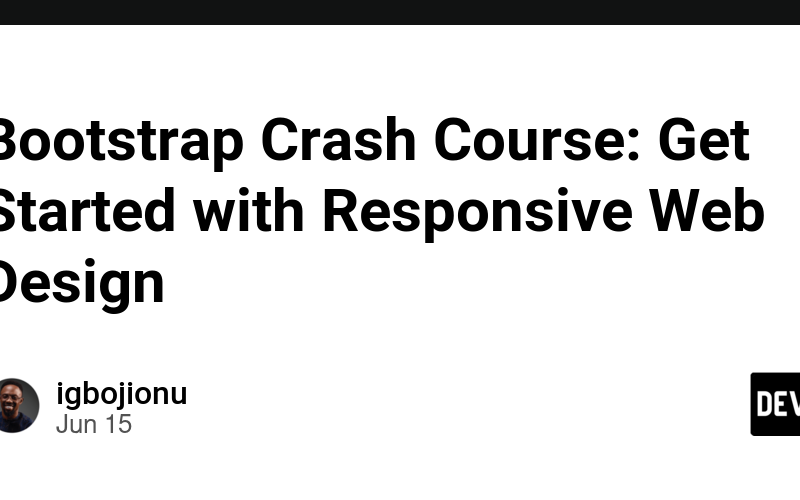Bootstrap is a powerful front-end framework that helps you build responsive and mobile-first web designs quickly and easily. Whether you’re new to web development or looking to streamline your workflow, this crash course will get you up and running with Bootstrap in no time.
What is Bootstrap?
Bootstrap is a free and open-source toolkit for developing with HTML, CSS, and JavaScript. It provides a collection of pre-designed components, like buttons, forms, and navigation bars, that you can easily integrate into your projects.
Why Use Bootstrap?
- Responsive Design: Bootstrap’s grid system ensures your layout adapts to various screen sizes, making your site mobile-friendly.
- Consistency: With a unified design language, Bootstrap makes it easy to maintain a consistent look across your website.
- Ease of Use: Pre-built components and utilities save time and effort.
- Community Support: Extensive documentation and a large user base mean you can find help and resources easily.
Getting Started with Bootstrap
- Include Bootstrap in Your Project
You can include Bootstrap via CDN (Content Delivery Network). Add the following links to the <head> section of your HTML file:
<!DOCTYPE html>
<html lang="en">
<head>
<meta charset="UTF-8">
<meta name="viewport" content="width=device-width, initial-scale=1.0">
<title>Bootstrap Crash Course</title>
<link href="https://stackpath.bootstrapcdn.com/bootstrap/4.5.2/css/bootstrap.min.css" rel="stylesheet">
<script src="https://code.jquery.com/jquery-3.5.1.slim.min.js"></script>
<script src="https://cdn.jsdelivr.net/npm/bootstrap@4.5.2/dist/js/bootstrap.bundle.min.js"></script>
</head>
<body>
<!-- Your content here -->
</body>
</html>
- The Bootstrap Grid System
The grid system is the core of Bootstrap’s responsive layout. It divides your page into rows and columns, making it easy to create layouts that adjust to different screen sizes.
<div class="container">
<div class="row">
<div class="col-md-4">Column 1</div>
<div class="col-md-4">Column 2</div>
<div class="col-md-4">Column 3</div>
</div>
</div>
In this example:
-
.containerprovides a responsive fixed-width container. -
.rowcreates a horizontal group of columns. -
.col-md-4creates three equal-width columns for medium-sized devices (≥768px).
- Common Bootstrap Components
Bootstrap offers a variety of pre-built components that can be quickly integrated into your project:
<button class="btn btn-primary">Primary Button</button>
<button class="btn btn-secondary">Secondary Button</button>
<nav class="navbar navbar-expand-lg navbar-light bg-light">
<a class="navbar-brand" href="https://dev.to/igbojionu/#">Navbar</a>
<button class="navbar-toggler" type="button" data-toggle="collapse" data-target="#navbarNav">
<span class="navbar-toggler-icon"></span>
</button>
<div class="collapse navbar-collapse" id="navbarNav">
<ul class="navbar-nav">
<li class="nav-item active">
<a class="nav-link" href="https://dev.to/igbojionu/#">Home</a>
</li>
<li class="nav-item">
<a class="nav-link" href="https://dev.to/igbojionu/#">Features</a>
</li>
<li class="nav-item">
<a class="nav-link" href="https://dev.to/igbojionu/#">Pricing</a>
</li>
</ul>
</div>
</nav>
<div class="card" style="width: 18rem;">
<img src="..." class="card-img-top" alt="...">
<div class="card-body">
<h5 class="card-title">Card title</h5>
<p class="card-text">Some quick example text to build on the card title and make up the bulk of the card's content.</p>
<a href="https://dev.to/igbojionu/#" class="btn btn-primary">Go somewhere</a>
</div>
</div>
- Responsive Images
Bootstrap also helps make your images responsive with the .img-fluid class:
<img src="image.jpg" class="img-fluid" alt="Responsive image">
- Utility Classes
Utility classes in Bootstrap are pre-defined classes that allow you to style elements quickly without writing custom CSS.
<div class="mt-3 mb-3">Margin Top and Bottom</div>
<div class="pt-2 pb-2">Padding Top and Bottom</div>
<p class="text-center">Centered Text</p>
<p class="text-right">Right-Aligned Text</p>
- Customizing Bootstrap
Bootstrap can be customized by overriding its default styles. You can add your own CSS rules to tailor the appearance of your site:
<style>
.custom-btn {
background-color: #ff6600;
color: white;
}
</style>
<button class="btn custom-btn">Custom Button</button>
Conclusion
Bootstrap is a versatile and powerful tool for web development, helping you create responsive, mobile-friendly websites with minimal effort. By mastering its grid system, components, and utilities, you can streamline your workflow and build beautiful web pages quickly.
Feel free to explore more about Bootstrap and experiment with different components and styles. The official Bootstrap documentation is a great place to start for more in-depth information and examples.
Source link
lol

